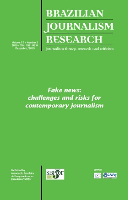
Brazilian Journalism Research
Scope & Guideline
Exploring the Pulse of Brazilian Journalism
Introduction
Aims and Scopes
- Journalism Practices and Innovations:
The journal critically examines various forms of journalism, including investigative, literary, and immersive journalism, focusing on how these practices evolve in response to technological advancements and societal changes. - Media and Political Dynamics:
It explores the relationship between media and politics, particularly in contexts of populism, government influence, and media censorship, providing insights into how journalism shapes and is shaped by political landscapes. - Social Issues and Activism:
The journal highlights the role of journalism in addressing social issues, including environmental activism, gender issues, and human rights, emphasizing the importance of journalism as a tool for social change. - Audience Engagement and Perception:
Research in this area focuses on how audiences interact with news media, including the impact of social media on news consumption and the credibility of information, reflecting the evolving nature of audience-journalist relationships. - Cultural Context and Comparative Studies:
It investigates journalism within cultural contexts, often comparing practices across different countries or regions, thus contributing to a broader understanding of global journalism trends.
Trending and Emerging
- Immersive and Experiential Journalism:
There is a growing interest in immersive journalism practices, including virtual and augmented reality, which are reshaping how stories are told and experienced by audiences. - Journalism and Activism:
Research is increasingly focusing on the intersection of journalism and activism, particularly in relation to environmental issues and social justice, highlighting journalism's role in advocacy. - Impact of Social Media on Journalism:
Studies examining the influence of social media on news dissemination, audience engagement, and the credibility of information are on the rise, reflecting the platform's significant role in modern journalism. - Populism and Journalism:
The relationship between populism and journalism has become a prominent topic, with researchers analyzing how populist narratives affect journalistic practices and media coverage. - Data Journalism and Analytics:
An increased emphasis on data journalism and the use of analytics in news reporting is emerging, as journalists seek to leverage data for more informed storytelling and audience engagement.
Declining or Waning
- Traditional Journalism Models:
There is a noticeable reduction in studies focusing solely on traditional journalism practices, as the field increasingly shifts towards exploring innovative and digital formats. - Economic Journalism Coverage:
Research specifically centered on economic journalism has become less frequent, perhaps due to a broader focus on social and political issues that resonate more with current global challenges. - Local and Regional Journalism Studies:
While still important, there appears to be a waning interest in studies solely dedicated to local and regional journalism, as researchers increasingly address broader national and international themes. - Journalistic Ethics in Established Media:
Discussions around ethics in traditional media outlets have decreased in favor of emerging ethical challenges posed by new media and citizen journalism. - Censorship Studies in Stable Democracies:
The focus on censorship within stable democratic contexts has diminished, reflecting a shift towards more pressing issues related to authoritarian regimes and their impacts on journalism.
Similar Journals
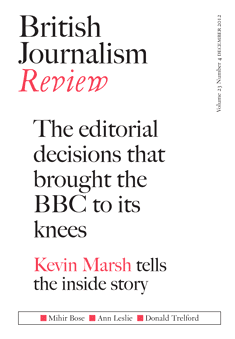
British Journalism Review
Navigating the Evolving Landscape of NewsBritish Journalism Review is a distinguished academic journal dedicated to the exploration and analysis of the rapidly evolving field of journalism. Published by SAGE Publications Ltd, this journal plays a critical role in disseminating high-quality research that addresses key issues facing journalists and media organizations today. With an ISSN of 0956-4748 and an E-ISSN of 1741-2668, it is a pivotal resource for scholars, practitioners, and students alike. Although the journal does not currently offer Open Access options, it maintains a strong commitment to academic rigor and innovation in journalism studies. By engaging with a diverse range of topics such as media ethics, the impact of digital technologies, and the changing landscape of news consumption, the British Journalism Review remains instrumental in shaping contemporary debates and enhancing the scholarly discourse in its field.

Connectist-Istanbul University Journal of Communication Sciences
Catalyzing Conversations in Communication and MediaConnectist-Istanbul University Journal of Communication Sciences is a distinguished academic publication under the auspices of Istanbul University, Faculty of Communication, dedicated to advancing the field of communication studies. Since its inception, this Open Access journal has facilitated the dissemination of groundbreaking research and innovative methodologies, particularly since it embraced an open access model in 2017, promoting wider accessibility and engagement. As a pivotal resource for researchers, practitioners, and students alike, Connectist fosters interdisciplinary dialogue, exploring contemporary issues in communication, media studies, and related disciplines. With a commitment to rigorous peer review and scholarly excellence, the journal serves as an essential platform for cutting-edge insights and developments in communication sciences, thereby contributing significantly to the academic community and beyond.
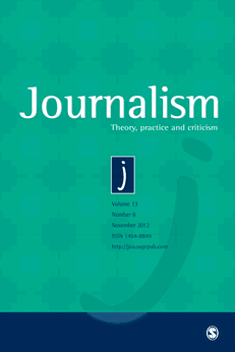
Journalism
Fostering Critical Dialogue in the Evolving Landscape of JournalismJournalism is a leading interdisciplinary journal published by SAGE Publications Inc, renowned for its rigorous academic standards and impactful research. With an ISSN of 1464-8849 and E-ISSN 1741-3001, the journal has established itself within the top quartile of both the Arts and Humanities and Communication fields, boasting an impressive rank of 22nd out of 552 in Arts and Humanities (miscellaneous) and 35th out of 511 in Social Sciences (Communication) as of 2023. This journal, based in the United Kingdom, is committed to fostering scholarly dialogue surrounding journalism’s evolving role in society, covering a wide range of topics including media ethics, digital communication, and the impact of state and global politics on public discourse. Notably, the journal does not offer open access, enhancing its exclusive appeal to academics and professionals. With a focused scope that extends from 2000 to 2024, Journalism contributes to the understanding of emerging trends and challenges, making it an invaluable resource for researchers, practitioners, and students alike seeking to engage deeply with contemporary issues in the field.

Analisi-Quaderns de Comunicacio i Cultura
Advancing interdisciplinary dialogue in Communication and Cultural Studies.Analisi-Quaderns de Comunicacio i Cultura, published by Universitat Autònoma de Barcelona, is a distinguished open-access journal that has been serving as a pivotal platform for interdisciplinary research in Communication and Cultural Studies since its inception. With an ISSN of 0211-2175 and E-ISSN 2340-5236, this journal not only contributes significantly to its fields, as evidenced by its impressive rankings—Q2 in Communication and Q1 in Cultural Studies for 2023—but also boasts strong Scopus placements, including a rank of 181 out of 1304 in Cultural Studies. The journal's commitment to open access since 2010 ensures that research findings are readily available to a global audience, fostering collaboration among scholars, practitioners, and students. Located in Cerdanyola del Vallès, Barcelona, this publication invites contributions that explore the dynamic and rapidly evolving intersections of culture and communication, making it an essential resource for those seeking to advance knowledge and engage critically in these essential areas of study.

Journalism and Media
Elevating Research in Journalism and Media to New HeightsJournalism and Media is a premier, peer-reviewed academic journal hosted by MDPI, dedicated to advancing knowledge in the fields of journalism, media studies, and communication. Established in 2020, this Open Access journal aims to facilitate the dissemination of high-quality research free of cost, promoting inclusivity and accessibility in academia. Additionally, it boasts a substantial reputation, reflected in its impressive Q1 rankings in both the Arts and Humanities as well as Linguistics and Language, and a Q2 category standing in Social Sciences (miscellaneous) for 2023. With Scopus rankings placing it within the top 15% of journals in its field, Journalism and Media not only contributes significantly to contemporary discourse but also provides an essential platform for interdisciplinary collaboration and innovation. Researchers, professionals, and students alike are encouraged to engage with the journal’s rich array of articles that explore the complexities of media dynamics, journalistic integrity, and the impact of technology on communication practices.

Doxa Comunicacion
Fostering innovative dialogue in communication studies.Doxa Comunicación is a prominent open-access journal dedicated to advancing the field of communication studies, published by Universidad San Pablo CEU, under the Faculty of Humanities and Communication Sciences. Established in 2003, this journal has gained recognition for its commitment to disseminating high-quality research and thought-provoking articles, fostering a vibrant academic community. With an ISSN of 1696-019X and an E-ISSN of 2386-3978, Doxa Comunicación occupies a vital niche in the academic landscape of Spain, contributing to both national and international discourses. In the 2023 rankings, it is categorized in the Q3 quartile within the fields of Communication and Social Sciences (miscellaneous), reflecting its competitive standing among peer publications. The journal's diverse scope, including contemporary communication theories and practices, ensures relevance for researchers, professionals, and students alike. With a Scopus rank of #333 in Social Sciences (miscellaneous) and #291 in Communication, Doxa Comunicación serves as an essential platform for innovative research that addresses the complex challenges of modern communication in a rapidly evolving society.

Journalism Studies
Connecting Scholars and Practitioners in Media InnovationJournalism Studies is an esteemed academic journal dedicated to advancing the field of media and communication, and it has established itself as a leading platform for innovative research in this dynamic discipline. Published by Routledge Journals, Taylor & Francis Ltd, this journal boasts an impressive Q1 ranking in Communication in 2023, reflecting its significant impact and contributions to the field, currently holding a Scopus rank of 64 out of 511 in Social Sciences Communication, placing it in the 87th percentile. Covering a rich spectrum of topics from journalism ethics to the role of technology in news dissemination, Journalism Studies aims to foster scholarly debate and provide critical insights that shape the future of journalism. With ongoing research spanning from 2001 to 2024, it serves as an essential resource for researchers, professionals, and students seeking to enhance their knowledge and engage with contemporary issues in journalism. For those looking to stay at the forefront of media studies, this journal represents a vital source of quality research and scholarly dialogue.
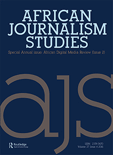
African Journalism Studies
Advancing the discourse of journalism across Africa.African Journalism Studies is a leading journal dedicated to advancing the field of journalism research within the African context. Published by Routledge Journals, a prestigious division of Taylor & Francis Ltd, this journal features a rich repository of scholarly articles that explore critical issues in journalism, media practices, and communication strategies across the continent. With an impressive Q2 ranking in Communication for 2023, African Journalism Studies is recognized for its influence and quality, ranking #202 out of 511 journals in social sciences communication and maintaining a 60th percentile position. Despite being a non-open access publication, it remains essential for researchers, professionals, and students looking to deepen their understanding of the dynamics of journalism in Africa, offering insights into converged media practices from 2015 to 2024. The journal contributes significantly to the academic discourse, fostering a more profound knowledge base and encouraging informed discussions that reflect the evolving landscapes of African journalism.
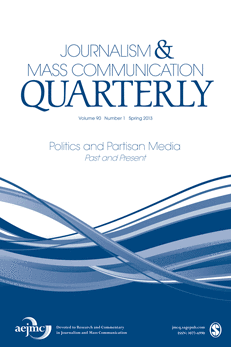
JOURNALISM & MASS COMMUNICATION QUARTERLY
Advancing insights in journalism and mass communication.JOURNALISM & MASS COMMUNICATION QUARTERLY, published by SAGE PUBLICATIONS INC, stands as a premier platform for scholarly discourse in the fields of journalism and mass communication. With an impressive Q1 ranking in the Communication category for 2023, this journal serves as an essential resource for researchers, professionals, and students seeking in-depth analysis and insights into contemporary media landscape challenges and evolutions. Its comprehensive scope, encompassing studies from as early as 1955 through 2024, provides a rich repository of historical and current research, ensuring a continuous dialogue about the impacts of media on society. Although not an Open Access journal, it remains highly regarded, evidenced by its Scopus rank of #41 out of 511 in the Communication field and a remarkable 92nd percentile ranking. As a critical resource, it contributes significantly to advancing academic knowledge and practical applications in journalism and mass communication.

Vestnik Moskovskogo universiteta. Seriya 10. Zhurnalistika
Connecting Theory and Practice in Media StudiesVestnik Moskovskogo universiteta. Seriya 10. Zhurnalistika, published by the prestigious M V Lomonosov Moscow State University, serves as a vital conduit for scholarly discourse in the fields of journalism and communication. With an ISSN of 0320-8079 and an E-ISSN of 0320-8079, the journal showcases rigorously peer-reviewed research and theoretical contributions that span diverse aspects of media studies, social communication, and journalism ethics. As of 2023, it is classified within the Q3 category in both Communication and miscellaneous Social Sciences, ranking #372 out of 511 and #445 out of 604, respectively, indicating its growing influence and relevance in these crucial academic domains. Despite not being Open Access, researchers and students alike can leverage the journal's valuable insights, which continue to shape contemporary understanding of media's impact on society. With a commitment to excellence and a focus on the rapidly evolving landscape of journalism, Vestnik Moskovskogo universiteta. Seriya 10. Zhurnalistika remains an essential resource for anyone looking to engage deeply with current debates and developments in the communication field.